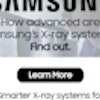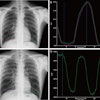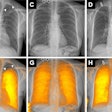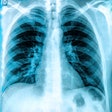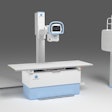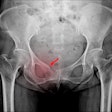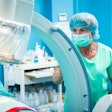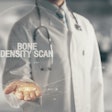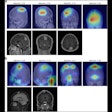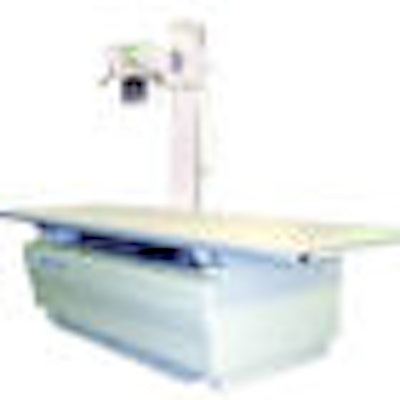
Radiography vendor Del Global Technologies has retooled its business model to focus less on manufacturing and more on systems integration, with the hope that the growing adoption of digital x-ray in the U.S. will offset the current decline in capital equipment purchasing.
The company's Del Medical Systems Group subsidiary believes it has developed a successful formula for navigating the global recession and propelling the 80-year-old company to the next level, according to James Risher, Del Global's president and CEO, and Dennis Runyan, Del Medical's vice president of sales and marketing.
The economic slowdown has profoundly affected sales of expensive capital equipment such as MRI and CT scanners as hospitals either have trouble raising financing or snap shut any new purchasing until the economy stabilizes. But firms that sell less expensive equipment are also being affected: In its financial results for the second quarter (end-January 31), Del itself posted a 17% revenue decline and a net loss of $1.8 million, compared with net income of $1.4 million in the same period the year before.
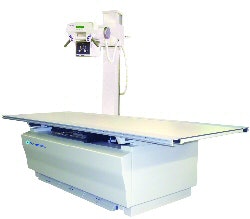 |
| Del's Titan radiography table. Image courtesy of Del. |
Del is hoping to ride this trend to renewed growth and profitability. Two years ago, the company began cutting costs by eliminating in-house manufacturing of parts and components in favor of outsourcing to local suppliers. As a result, the company has been able to downsize its headquarters facility, and in June, Del plans to move from a 60,000-sq-ft manufacturing-oriented factory in Franklin Park, IL, to a more modern 22,000-sq-ft facility in nearby Roselle.
Del spent much of 2008 recruiting third-party manufacturers to source products in an effort to standardize its digital product line with the same software, interface, platform, and detector, even as it downsized its U.S. corporate headquarters to reflect the changes.
"We all have to be conscious as to what this current environment is doing to business," Risher said. "Clearly, every company is under pressure to reduce costs. We've introduced lean manufacturing into our process, outsourcing components and manufacturing to lower inventory costs and overhead."
Furthermore, Risher recognizes the financial pressures most providers are experiencing. "Budget cutbacks are affecting capital expenditures, so we're trying to offer a less expensive alternative to supporting an array of CTs and MRIs," he noted.
Del sees its target market as midtier hospitals in the 300-bed range, according to Risher. In particular, Del believes that its U.S. activities will be driven by installing retrofit digital detectors for analog radiography systems.
"We have a pretty significant installed base [in the U.S.]," Risher said. "Everyone expected the transition to digital from analog to come at a faster pace, but cost has been a key factor. Flat panels coming down in price is helping."
But Del also competes internationally, and there it sees more of a market for new systems. "International outlets offer us bigger sales opportunities where we are going to intentionally focus on new installs," Risher continued. "In the U.S. we're focusing on conversions."
In fact, the global market offers Del some ripe sales opportunities as the U.S. market matures, according to Runyan. He cited Russia and countries in South America as examples. They are building their infrastructure and investing in their respective healthcare systems, he said.
Systems integration
Converting and retrofitting radiography rooms in U.S. healthcare facilities to digital requires more than just product placement, Runyan noted, which is why Del is focusing on systems integration in the U.S. "[This migration] increases the need for stronger support and service centers because there are more responsibilities in service, support, and training," he said.
Prior to the digital era, life cycles for much of the equipment sold tended to be longer, such as 15 to 20 years, according to Risher. So an analog system that Del sold six years ago still has years of life left in it -- especially if it can be converted to digital.
Consequently, Del is targeting hospitals that may have bought analog radiography rooms within the past five years or so to retrofit them to digital, specifically those hospitals that may have acquired equipment from a manufacturer no longer in business or one that was acquired by another company that doesn't support the products.
Modularity and portability are important, Runyan stressed. Portable DR panels can help a facility reduce the number of computed radiography rooms necessary or compensate for equipment needing repairs and preventing downtime. It can also help facilities use their equipment more efficiently, with portable DR units operating in the radiology department until the close of business and then being moved to the emergency department for trauma use during off-hours.
"Rather than letting the detector sit there overnight, the facility can put it on the floor or in the ER for evening use, which is a lot more efficient," he said. "You can bring the x-ray to the patient and not the other way around," he added. "You don't want to have to move the patient."
By Rick Dana Barlow
AuntMinnie.com contributing writer
April 16, 2009
Related Reading
Del Global sales slip in Q2, March 18, 2009
Del Global to relocate, March 9, 2009
Del signs Shin, February 23, 2009
Del wins Mexico contract, February 10, 2009
Del suspends stock repurchase program, January 1, 2009
Copyright © 2009 AuntMinnie.com

